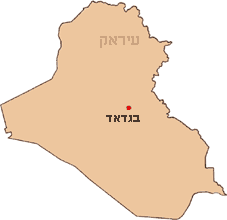Bagdad
Bagdad is a term that may refer to several locations and historical contexts, primarily known for its association with the capital city of Iraq, Baghdad. This article will focus on providing an overview of the term, its significance in various contexts, and its historical and cultural relevance.
Etymology[edit | edit source]
The name "Bagdad" is believed to derive from Persian compounds, translating to "God's Gift" or "Given by God," reflecting the city's historical significance and prosperity. The exact origins of the name are subject to historical debate, but it is widely accepted that the name reflects the city's importance in ancient and medieval times.
Historical Significance[edit | edit source]
Baghdad has a rich history, dating back to its founding in the 8th century by the Abbasid Caliphate. As the capital of the Abbasid Empire, Baghdad became a leading center of the Islamic Golden Age, renowned for its advancements in science, mathematics, medicine, and philosophy. The city's strategic location along the Tigris River contributed to its prosperity as a trade hub, connecting the East and West.
Medieval Period[edit | edit source]
During the medieval period, Baghdad was known for its architectural marvels, including the famous House of Wisdom, where scholars from various parts of the world gathered to share knowledge. The city's libraries and academies played a crucial role in preserving and enhancing the knowledge of ancient civilizations.
Modern Era[edit | edit source]
In the modern era, Baghdad has faced numerous challenges, including conflicts and political instability. Despite these challenges, the city remains a symbol of cultural and historical richness, with efforts underway to preserve its heritage and rebuild its infrastructure.
Geography[edit | edit source]
Baghdad is situated in the central region of Iraq, along the banks of the Tigris River. The city's geography has played a significant role in its development and history, offering fertile land for agriculture and a strategic position for trade and military endeavors.
Culture[edit | edit source]
The culture of Baghdad reflects a blend of Arab, Persian, and Islamic influences. The city is known for its diverse population, traditional music, literature, and cuisine. Baghdad's cultural heritage is evident in its architecture, including historic mosques, palaces, and markets.
Economy[edit | edit source]
Baghdad's economy historically thrived on trade, agriculture, and craftsmanship. In recent years, efforts have been made to diversify the economy, focusing on sectors such as energy, construction, and services. The city's economic recovery is closely tied to the broader stabilization and reconstruction efforts in Iraq.
Education[edit | edit source]
Baghdad is home to several prestigious institutions of higher education, including the University of Baghdad, which has contributed significantly to the academic and professional development of the region. Education remains a key focus for the city's development and growth.
Conclusion[edit | edit source]
Baghdad's rich history, cultural diversity, and strategic importance make it a significant city in the Middle East and the world. Despite facing numerous challenges, Baghdad continues to be a symbol of resilience and cultural richness, with ongoing efforts to preserve its heritage and ensure a prosperous future.
Search WikiMD
Ad.Tired of being Overweight? Try W8MD's physician weight loss program.
Semaglutide (Ozempic / Wegovy and Tirzepatide (Mounjaro / Zepbound) available.
Advertise on WikiMD
|
WikiMD's Wellness Encyclopedia |
| Let Food Be Thy Medicine Medicine Thy Food - Hippocrates |
Translate this page: - East Asian
中文,
日本,
한국어,
South Asian
हिन्दी,
தமிழ்,
తెలుగు,
Urdu,
ಕನ್ನಡ,
Southeast Asian
Indonesian,
Vietnamese,
Thai,
မြန်မာဘာသာ,
বাংলা
European
español,
Deutsch,
français,
Greek,
português do Brasil,
polski,
română,
русский,
Nederlands,
norsk,
svenska,
suomi,
Italian
Middle Eastern & African
عربى,
Turkish,
Persian,
Hebrew,
Afrikaans,
isiZulu,
Kiswahili,
Other
Bulgarian,
Hungarian,
Czech,
Swedish,
മലയാളം,
मराठी,
ਪੰਜਾਬੀ,
ગુજરાતી,
Portuguese,
Ukrainian
Medical Disclaimer: WikiMD is not a substitute for professional medical advice. The information on WikiMD is provided as an information resource only, may be incorrect, outdated or misleading, and is not to be used or relied on for any diagnostic or treatment purposes. Please consult your health care provider before making any healthcare decisions or for guidance about a specific medical condition. WikiMD expressly disclaims responsibility, and shall have no liability, for any damages, loss, injury, or liability whatsoever suffered as a result of your reliance on the information contained in this site. By visiting this site you agree to the foregoing terms and conditions, which may from time to time be changed or supplemented by WikiMD. If you do not agree to the foregoing terms and conditions, you should not enter or use this site. See full disclaimer.
Credits:Most images are courtesy of Wikimedia commons, and templates Wikipedia, licensed under CC BY SA or similar.
Contributors: Prab R. Tumpati, MD

